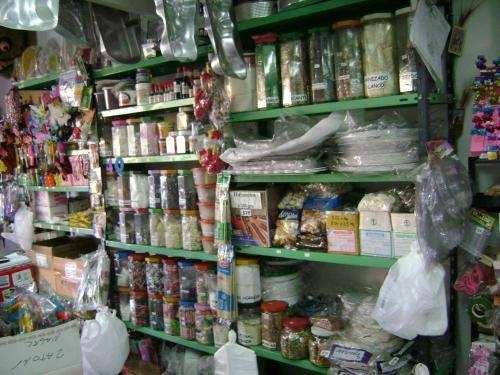Many foreigners are used to being able to find everything they need at the local supermarket back home – but here in Buenos Aires, it’s often necessary to go to a specialty store to find certain items.
Barrio Chino – This little neighborhood in general is fun to explore, since it has many little shops and restaurants. But the supermarkets are the highlight, since the key difference between a Barrio Chino supermarket and a regular supermarket is that in Barrio Chino the shelves are full of exotic products. This is a place to find more obscure foods that have to be imported (mostly from different parts of Asia) as well as hard-to-find locally produced goods, such as molasses and peanut butter. The supermarkets there also have a great selection of herbs and spices (dried and fresh); nuts, seeds, and beans, assorted sugars,tofu, and, of course, sushi.
Bazar – If you’re in need of a greater selection and quality cook- and bakeware, then you’re in need of a bazar. These stores stock pots, pans, cooking utensils (such as knives), everyday dishes and china sets, crystal, as well as kitchen appliances. Be careful, though, since these places also stock expensive professional-grade goods as well.
Cotillón – This type of store carries party supplies, but “party supplies” could 
Dietética – For people trying to find organic and healthier alternatives or who have restricted diets (gluten-free, diabetic, vegetarian, or vegan), a dietética (health food store) is the place to go. These stores specialize in organic and natural food products, such as nuts & seeds, dried fruits, whole-wheat products, organic products (such as honey), gluten-free alternatives, sugar-free snacks, soy products, natural sweeteners, and herbal and dietary supplements.
Fiambrería (Delicatessen) – These stores carry cheeses and cold cooked meats, such as salami. While most, if not all, neighborhood supermarkets will have a fiambrería section, they will typically only carry the most common and popular products. If you can’t find what you’re looking for at the supermarket, look for a specialty store near you and they’ll have a much bigger variety to choose from. Another option is to go to a very large supermarket (such as a Disco, Jumbo or Carrefour) – depending on the size of the branch, these giant supermarkets often have a better-than-average selection.
Fresh Herbs – If you’re stopping by the local verdulería (vegetable stand) and can’t immediately see parsley or other fresh herbs available, be sure to ask the people working there. If they have them, they’re often kept in the fridge (and consequently, out of sight). If they don’t, they can often point you in the direction of another verdulería nearby. Sometimes it may be necessary to go to as many as 3 or 4 places in order to find the right ingredients.
Fruits and Vegetables – While the most common fruits and vegetables are available at all of the large supermarkets, be sure to check out your local verdulería first. The local vegetable stand is likely to have fresher and higher quality produce, may have more exotic products than the big supermarket, and they often have competitive prices.
Pescadería – While large supermarkets will often have fresh fish available, the smaller ones won’t because fish is not a staple of the porteño diet. Instead, you’re better off going to a seafood store (pescadería), where they’ll have a larger selection. (Note: Canned tuna can easily be found everywhere.)
Repostería – When aiming to stock up on baking supplies, you may find your local supermarket sorely lacking. But fortunately, you can find everything you need (decorations, pans, molds, and ingredients) at your local repostería.
Hungry Kat
Google+






